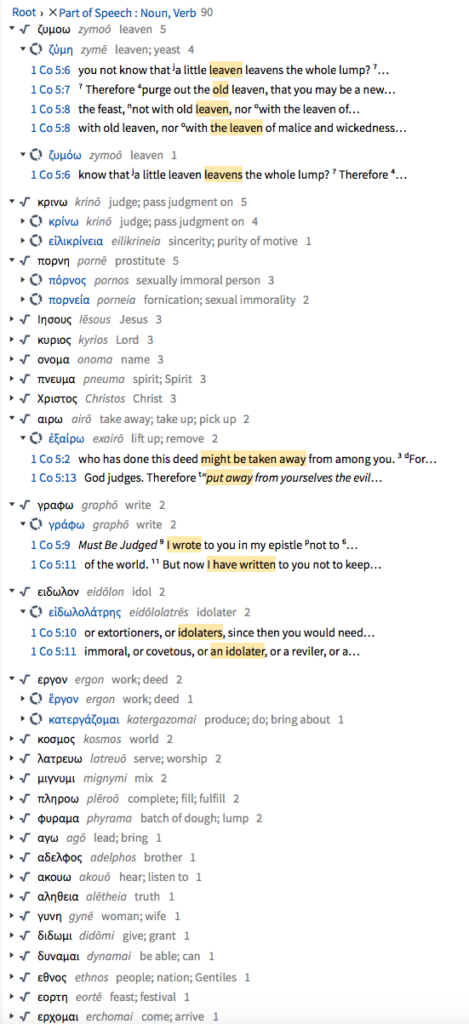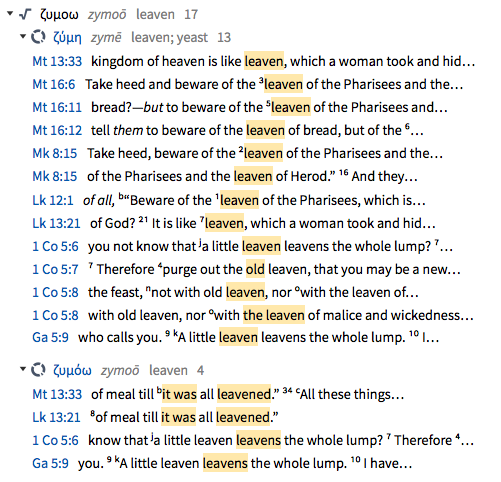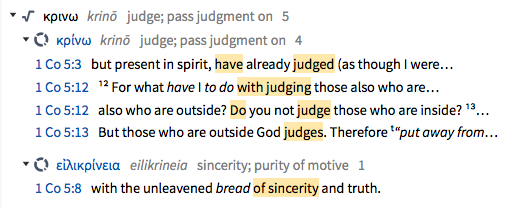UPDATED 10/31/17
(added a text comparison pdf under Para. 1.A., and added to the end of Para. 16, and added a Para. 17)
Below are various study resources for 1 Cor. Ch 5.
- PDF of the NKJV of Ch 5 showing the transliterated root word, and the Strongs G number below, given here: 1 Cor 5 NKJV:
- 1 Cor 5 shown in “text comparison” format, contrasting three translations with the NKJV, all in English: the NKJV compared to ESV and NASB.
Text Comparison 1 Cor 5
(as with other pdf docs on this website, you need to click twice to get to a full size pdf doc that you can then either read on screen or download and print)
- 1 Cor 5 shown in “text comparison” format, contrasting three translations with the NKJV, all in English: the NKJV compared to ESV and NASB.
- Word frequency with expansion of key word (nouns and verbs only, not including the verb “to be” (in all its various forms). Note the frequency of Jesus (3x), Lord (3x), Christ (3x), Spirit (3x).

- Imperative verbs in 1 Cor. 5:7

- Three words occur five times each in even this short Ch. 5: porne (sexually immoral), yeast, and judge. And they are all interrelated as will be discussed later.
- One important word in this passage, and apparently, sadly, in the Corinthian church is porne, which as shown in Para. 2 above, occurs five times in just this short Ch. 5. Obviously this word relates to the English word pornography (which word means, literally, porn-writing). However, the Greek word porne from which it derives does not (ordinarily) mean words or images, but actual deeds and even persons. Below is a definition of the word and its cognates, copied from Zodhiates, S. (2000). The complete word study dictionary: New Testament (electronic ed.). Chattanooga, TN: AMG Publishers.:
- 4202. πορνεία porneía, gen. porneías, fem. noun from porneúō (4203), to commit fornication or any sexual sin. Fornication, lewdness, or any sexual sin.
(I) Any sexual sin; coupled with moicheía (3430), adultery (Mark 7:21), and other sins (Rom. 1:29). Used generally to refer to any sexual sin (1 Cor. 6:13, 18; 7:2; 2 Cor. 12:21; Gal. 5:19; Eph. 5:3; Col. 3:5; 1 Thess. 4:3; Rev. 9:21). In John 8:41, “We be not born of fornication” means, “We are not spurious children, born of a concubine, but are the true descendants of Abraham” (a.t. [Sept.: Gen. 38:24; Hos. 1:2]). Specifically of adultery (Matt. 5:32; 19:9); of incest (1 Cor. 5:1). Porneía may also refer to marriages within the degrees prohibited by the Law of Moses and generally to all such intercourse as prohibited in that Law (cf. Lev. 18; 20:10ff.).
(II) Symbolically it stands for idolatry, the forsaking of the true God in order to worship idols. Since God is said to be married to His Church through Christ, then any idolatry is unfaithfulness toward God equal to sexual unfaithfulness to one’s marriage partner (Rev. 2:21; 14:8; 17:2, 4; 18:3; 19:2; Sept.: Jer. 3:9; Ezek. 16:15, 22; 23:27; Hos. 2:2; 4:12).
(III) Fornication as a sexual vice was common before the time of Moses and was grossly prevalent in Egypt (Gen. 39:7). Prostitution was not tolerated by the Sinaitical code, being an abomination in the sight of God (Lev. 19:29; Deut. 23:17, 18). Its price could not be accepted in the sanctuary (Mic. 1:7), and death by stoning was the penalty for an unmarried woman who had concealed her crime (Deut. 22:20, 21). The term “strange woman” in Prov. 2:16 probably referred to a harlot procured from foreigners. See also Prov. 2:16–19; 5:3–6; 7:5–27. God’s displeasure was thus incited (Jer. 5:7; Amos 2:7; 7:17). Such excesses were very common among the heathen in the times of the Apostles (1 Cor. 5:1, 9, 10; 6:9). Israel is symbolically presented as a harlot (Is. 1:21; Jer. 2:20; Ezek. 16; Hos. 1:2; 3:1).
Syn.: akrasía (192), lack of self–restraint; asōtía (810), profligacy; hēdonḗ (2237), pleasure, hedonism; asélgeia (766), intemperance, insatiable with regard to pleasure.
Ant.: hagnótēs (54), purity; hagneía (27), chastity; katharótēs (2514), the state of being cleansed, clean; egkráteia (1466), continence; hagiótēs (41), holiness; hagiōsúnē (42), sanctity. - 4203. πορνεύω porneúō; fut. porneúsō, from pórnos (4205), a male prostitute. To commit fornication, to play the harlot. Intrans.:
(I) Particularly (1 Cor. 6:18; 10:8; Sept.: Hos. 3:3).
(II) From the Hebr. symbolism for idolatry, the relationship existing between God and His Church (being exemplified by the emblem of the conjugal union) which is broken by those who worship idols (Rev. 2:14, 20); followed by metá (3326), with, and the gen. (Rev. 17:2; 18:3, 9).
Deriv.: ekporneúō (1608), to practice fornication which implies excessive indulgence; porneía (4202), fornication, lewdness.
Syn.: moicheúō (3431) and moicháō (3429), to commit adultery. - 4204. πόρνη pórnē; gen. pórnēs, fem. noun from pernáō (n.f.), to sell, which is from peráō (n.f.), to pass through, carry over (particularly as merchants) and thence to sell, which in the NT appears pipráskō (4097). A harlot or prostitute (Matt. 21:31, 32; Luke 15:30; 1 Cor. 6:15, 16; Heb. 11:31; James 2:25; Sept.: Gen. 38:15; Josh. 2:1). Babylon is called pórnē, the great harlot, being the chief seat of idolatry since porneía is symbolic of idolatry (Rev. 17:1, 5, 15, 16; 19:2; Sept.: Is. 1:21; Ezek. 16:29ff.).
Syn.: moichalís (3428), an adulteress. - 4205. πόρνος pórnos; gen. pórnou, masc. noun from pernáō (n.f.), to sell, which is from peráō (n.f.), to pass through, carry over (particularly as merchants) and thence to sell, which in the NT appears pipráskō (4097). A whoremonger or male prostitute. In the NT a fornicator (1 Cor. 5:9–11; 6:9; Eph. 5:5; 1 Tim. 1:10; Heb. 12:16; 13:4; Rev. 21:8; 22:15). The Greeks considered one who prostituted himself for gain as a pórnos. In this sense it seems to be used in 1 Cor. 6:9 where malakoí (pl.) (3120), the effeminate, are also mentioned. The distinction between them and pórnoi, fornicators, seems to consist in that the pórnoi prostitute themselves for gain, but the malakoí, effeminate ones, do it without charge. It is in this manner that the word is used in Eph. 5:5; 1 Tim. 1:10. The word also has the meaning of an impure or unclean person of whatever kind, and it is thus used in 1 Cor. 5:9–11 (cf. 5:1, 13); Heb. 12:16; 13:4; Rev. 21:8; 22:15. Pórnos does not occur in the Sept.
Deriv.: porneúō (4203), to commit fornication.
- 4202. πορνεία porneía, gen. porneías, fem. noun from porneúō (4203), to commit fornication or any sexual sin. Fornication, lewdness, or any sexual sin.
- Another word that also occurs five times in this chapter is leaven. It has an important beginning in the NT, in the Gospel of Matthew (primarily), as shown below:

- The third word that occurs five times is krino (judge) which we saw used many times in Ch 4. Here is where the root occurs in Ch 5:

- How might we understand the interrelationship between porne and yeast, and then with krino?
- As is evident from Para. 6 above, yeast, a substance of everyday use and understanding at that time (less so today), is commonly used as a metaphor. How might the metaphor usage also apply to the problems / issues in Ch 1-4, namely: divisions (by virtue of following one man or another), emphasis on human wisdom, and puffing up?
- One of the realities of Christian history is decay, corruption, and collapse of Christian “institutions,” be they local assemblies (churches), universities, missions, service organizations, etc.. Although we can think of examples where such collapse was sudden because of some crushing external force, the predominant mode appears to be decay from within. Consider the YWCA (do a web search). How does a yeast metaphor help us understand this? In Corinth such a yeast metaphor has a different character than Galatia; from a quick read of the Epistle to the Galatians, what is the yeast-difference from Corinth?
- In Ch 4 there were certain admonitions against “judging” (krino). We noted then that such caution cannot extend to a prohibition against discernment as that would conflict with other Scripture. Here in Ch 5 we find a clear command to judge. How do we reconcile this with Ch 4 about not judging? Greg Koukl’s essay, cited previously, may be helpful here as well. Why might the Corinthian church, and especially its Elders, have gone along with the porne error of Ch 5?
- As can be seen above, porne and idolatry / corruption are highly correlated ideas. Think of the many OT examples, especially the outstanding, and horrible example, of the Book of Judges. How might porne here in Corinth also be a symptom of a deeper underlying corruption of idolatry?
- And I cannot pass up the opportunity to preach against “Easter.” The word easter derives from the Gr. word Astarte which is the name of the prominent Gr. mother ‘goddess,’ and is in turn derived from Ashtoreth (aka Asherah) which were the Hebrew OT equivalents. Asherah was the ‘wife’ of Baal (Ba’al), the ‘father god’ especially associated with prosperity. Asherah thus, in turn, was tightly associated with fertility and related pleasures. Thus the importance of springtime rituals honoring Asherah / Astarte so that (by such ‘dealmaking) the livestock in their mating would be highly fertile. And thus we have eggs and bunnies going on even today with the (in my opinion) utterly corrupt Christian (!) celebrations of “Easter.” That is why, thankfully, many Christian groups now refer to the spring event on the calendar as “Resurrection Sunday” and not Easter.
- There are many OT passages regarding Asherah. Here are just two examples: 2 Chron 15:16 Even Maacah, his mother, King Asa removed from being queen mother because she had made a detestable image for Asherah. Asa cut down her image, crushed it, and burned it at the brook Kidron.
and Micah 5:14 and I will root out your Asherah images from among you and destroy your cities. - Here are example verses where Asherah and Baal both occur: Judges 6:25, 28, 30; 1 Kings 18:19 re Elijah’s judgment: “Now therefore send and gather all Israel to me at Mount Carmel, and the 450 prophets of Baal and the 400 prophets of Asherah, who eat at Jezebel’s table.” And in the context of awful King Manasseh following the example of Ahab (and Jezebel), 2 Kings 21:3 For he [Manasseh] rebuilt the high places that Hezekiah his father had destroyed, and he erected altars for Baal and made an Asherah, as Ahab king of Israel had done, and worshiped all the host of heaven and served them.
- It gets even worse. Astarte is associated with “stars” (the very word comes from the same Gr root) and everything associated with astrology (which means, literally, words / study of “astarte“), which is not in any way connected to the genuine science of astronomy. Astrology is one manifestation of the mystery religions of idolatry, which seems to have an increasing number of ‘worshippers’ even today in an era of intense, genuine science. Although I don’t recommend it, if one searches for “astrology and astarte” one gets more than 300,000 ‘hits’ which would take more than a lifetime to go through.
- There are many OT passages regarding Asherah. Here are just two examples: 2 Chron 15:16 Even Maacah, his mother, King Asa removed from being queen mother because she had made a detestable image for Asherah. Asa cut down her image, crushed it, and burned it at the brook Kidron.
- Two articles from the August 2017 issue of Tabletalk magazine (a publication of Ligonier Ministries, www.Ligonier.org) are particularly relevant to our discussions here:
- Boasting Tabletalk Aug 2017 (being “puffed up”)
- Keeping Faith Tabletalk Aug 2017, even, especially, in a time when it is opposed by the surrounding culture.
- The late Elisabeth Elliot was Godly-wise about many things. One of her books, Discipline: The Glad Surrender, is especially insightful especially in our age of the exaltation of the Self. Although not specific to 1 Corinthians or our present Ch 5, her observations on our natural tendency to pursue our own ‘wisdom,’ which is what is going on here in Ch 5, has many sources of corruption, all emanating from the ‘big I / me / myself.’ Here’s her words (Ch 8, p. 67, Discipline) regarding “The Discipline of the Mind:”
Whose glory do I seek?…There is no end to the sophistries we are capable of substituting for clear thinking:
A. Pragmatism (it’s right if it works for me),
B. Technical feasibility (science has found a way to do it, so let’s do it),
C. Relevance (I can relate to this),
D. Comfort (I feel comfortable with this),
E. Happiness (I feel happy about this),
F. Moderation (I certainly don’t want to go to extremes),
G. Obligation (I owe this to myself),
H. Responsibility (it’s my life), and so on.[We could probably use her categories as shorthand references for our own carnal thinking as: “I just doing E today,” or “This looks like a G to me,” etc. When confronted with the thought of donuts, we can simply say “It’s an A through H day!” or, more accurately, a “B through H“.] (I should note, the italicized words are Elisabeth’s but the lettered headings are mine; and for any reader who does not think any such category applies to you, note her final category includes “and so on”).
- There is a term of art used today for the kind of self-analyses/delusion described by Elisabeth Elliot’s above categories, it is the very word she used to describe them–sophistries–and which word we considered earlier in 1 Cor., namely Ch 2, G4678, sophia. There we learned that there are two sophia’s: the world’s and God’s. (The sophia of the scientific ‘world’ is God’s sophia, because it is based, or should be based, on the actual realities of God’s creation; but the kind of sophia in Corinth, and around us in many respects today, is a ‘wisdom’ based on man’s subjective ‘realities.’ Sophistries are most clearly evident today in debates and especially elections. Courtroom lawyers are actually trained in it, and those especially so talented are highly rewarded. In political contexts, sophistry is called “spin,” which term arose, I suppose, because “you are about to get your head spinning to such an extent that you’ll forget your original question and will walk away thinking my client / candidate is a saint.”
A recent article in Christianity Today examined a noted early 20th Century theologian’s rationale for, let’s say, a significant moral inconsistency with the clear teaching of the Scriptures, which Scriptures he knew extremely well. (This article arose because of a passel of his letters have been recently published; the guy has long passed, so there is no need to chase the details of his particular moral failing). What the article develops is that such theologian’s solid and rightly-praised methodology in interpreting the Bible, in contrast to the liberalism of the 19th Century against which he reacted, he did not apply to his own life with regard to a very significant issue. The problem in such instance, and in Corinth, was not that man is prone to sin by nature–that is of course a problem, but one we already know all too well–it is that we develop rationale for why that some particular sin is not a problem, or even that it is actually (and here’s the ‘spin’) a “good thing.” Each of us faces this issue with respect to something in the Scriptures. That confrontation leads us to Three Choices: Deny, Defy, of Humbly Accept. In the case of that noted theologian, and all too often in our own, and as occurred here in Ch 5 in the Corinthian church, the cunningly deceitful “Deny” Choice was made, whereby one agrees that the Bible is authoritative and teaches what it does but in the convoluted circumstances of my subjective desires / ‘needs’ there is a contrary ‘application’ that is ‘true’ and ‘valid,’ and actually should be praised. We see it clearly in Ch 5 because the Corinthian church had actually boasted (were “puffed up,” 1 Cor. 5:2, G5448) about the very thing that should have been condemned (1 Cor. 5:1, G4202). We see this Choice being made everywhere around us, starting with the natural inclinations our own hearts.
Theologian rationale, abbreviated article of an abbreviated excerpt of the article in CT, with deletions of the names of the parties involved. (I understand it’s easy to find out the names I’ve blanked out, but I’d encourage you not to do so; the point is not the particulars but the universal impulse to rationalize, even by the best of us, as was clearly the case here in 1 Cor. 5). - Is it possible that what’s going on wrongly in Corinth is trying ‘to fit’ Christ and His Word into the prevailing culture, so following Christ does not look totally crazy, alien from those of the prevailing culture? If so, then C.S. Lewis: Don’t Compromise Your Values to Fit In can be useful.
______________________________
Ch 6 resources are here: